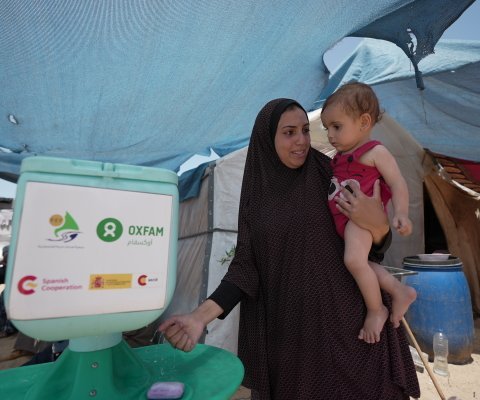International aid agency Oxfam today welcomed UN Secretary-General Ban Ki-moon's visit to the Democratic Republic of Congo and urged UN member states not to abandon the war-torn country in the wake of the recent successful elections.
Oxfam hopes that going to the DRC on his first official foreign trip demonstrates Mr. Ban’s commitment to reversing one of the world’s most dire humanitarian crises. Despite the shift toward democracy, the country remains extremely unstable, with more than 1,000 civilians reportedly dying each day from conflict-related causes.
"The DRC is at a critical point," said Juliette Prodhan, head of Oxfam in the DRC. "December's elections were a success, but the new government structures are fragile. Without the continuing support of the UN peacekeepers, there is a risk that the DRC could slide back into conflict and chaos. Oxfam hopes that the UN member states will not abandon the millions of Congolese who voted for peace and stability."
Oxfam called on Mr. Ban to encourage the Security Council to keep the UN peacekeeping force (MONUC) at its current strength when its mandate is renewed in February and not to draw down troop numbers prematurely. Despite a difficult start, MONUC has been an essential part of the Congo's transformation. In addition to protecting civilians, the peacekeeping force should concentrate on supporting the new Congolese government in training its security forces--which regularly attack civilians--so they can instead defend the country and protect its citizens.
"While peacekeeping demands in Africa are on the rise, finding troops to protect vulnerable people from Somalia to Sudan should not come at the expense of security for the long-suffering Congolese," said Prodhan. "It is the responsibility of the international community to ensure that the basic human rights of all civilians living under the devastating specter of war are respected."
###
Notes to editors
- In January 2006, the British medical journal Lancet published the results of an International Rescue Committee-led mortality survey, reporting 38,000 deaths in DR Congo every month above what is considered a "normal level" for the country. This translates into 1,250 excess deaths every day.
- Oxfam provides clean water and sanitation to tens of thousands of displaced people in eastern DRC, supports rehabilitation programs for the conflict-affected population and former combatants, and assists Sudanese refugees in the north. In the west, Oxfam has an education program that focuses on the accessibility and quality of primary education.
- MONUC, the UN peacekeeping force in the Congo, is the largest UN mission in the world, with over 17,000 soldiers. Its mandate comes up for renewal on 15 February 2007.


